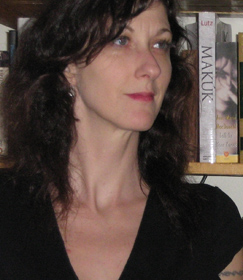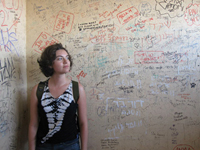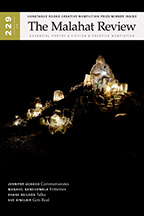WordsThaw 2014: Rachel Lallouz
in Conversation with Amy Reiswig

In preparation for WordsThaw 2014, Malahat Marketing & Promotional Assistant Rachel Lallouz spoke with WordsThaw participant Amy Reiswig on community, creative resistance, and the commitment to one's own writing.
Amy will be the moderator for Shining a Light: Writer as Witness at this year's symposium.
What do you hope to take away from WordsThaw this year?
Cheap books at the book sale! Kidding. I don’t even know if they are having that this year. More seriously, I hope to just learn. I’m a taker-inner, a sponge. I hope to learn new perspectives and, naturally, new books I should be adding to my ever-expanding pile.
How would you describe the value that events like WordsThaw bring to the literary community in Victoria and beyond?
It’s a forum to listen, think and talk. So much discussion now happens online, and having an opportunity to come together over particular issues and actually ask questions, hear answers, and have dialogue keeps our minds limber, helps us feel more invested in the issues being discussed. An event like WordsThaw also reminds us what a wealth of great thinkers and writers we have locally! It’s amazing! We, the people in our community, are our most precious resource, and having a forum to tap into that face to face, meet and make connections, can be mind- and even life-changing.
At last year’s WordsThaw, you acted as moderator for Zoom in, Zoom Out: Focus on Fiction. You’ll be a moderator again this year for the panel entitled, Shining a Light: Writer as Witness, one that explores vision or seeing in relation to writing, much like “Zoom in” did last year. Are you personally preoccupied with this connection?
Good point! Yes. Just based on biology, we are all first and foremost perceivers. Our eyes go ahead of us, or our ears and touch for those without sight. We then synthesize it all in our minds. I love that Robinson Jeffers called the human skull “a shell full of lightning.” Everything we write comes out of that shell, that storm of energy inside. It’s alchemy in there, and no one ever quite sees what we see. We all have, more or less, the same sensory organs, yet what they convey to us is so amazingly different! Which is what makes writing―and all arts―so rich, diverse, powerful and endlessly surprising.
Do you have any burning questions or comments on the topic of “writer as witness” that you plan to ask the panelists?
Oh yeah! Because they are all coming to the topic from different backgrounds (First Nations, science, international human rights) and genres (fiction, science writing, poetry and non-fiction). But you’ll have to go to the symposium to hear those questions!
What are your thoughts on the importance of writers employing their craft as a form of “creative resistance” in today’s society?
Our minds are one of the few things mostly under our control (barring severe cases of illness or brain injury). Our actions are circumscribed by laws made by people we might not have elected; our environment can be forever altered as a result of decisions made behind closed doors; who receives help from whom is often dictated by economic forces that many of us can’t even make sense of―and so many other parts of our lives can be our control. But our minds and spirits are, while touchable by the external, still ours. That’s why I believe thinking and feeling, and then translating that thought into words, is important as a means of staking out your territory, making others think and then stake out theirs. It’s as important to articulate it to yourself as it is to take that stand publicly because it means you are engaged.
All resistance, critique, awareness raising, or thought provoking has to first start inside. And it’s really one by one that we can ever hope to have an impact on the world. Unless they’re on the bestseller list, writers never know who reads them―how many, what the impact is, or if they are just throwing their words into the void. And so the beauty has to also be in that moment of individual commitment to write. To me, the tremendous power of individual commitment is awe-inspiring. Yes, we can help each other see big issues in new ways, but we can also help each other see the power of one. Different genres also allow writers to say things others can’t, and that can affect how people evaluate both what’s in front of their eyes and what’s behind them.

Rachel Lallouz
* * * * * * * *
Visit our WordsThaw website for full details on symposium events and ticket information!









